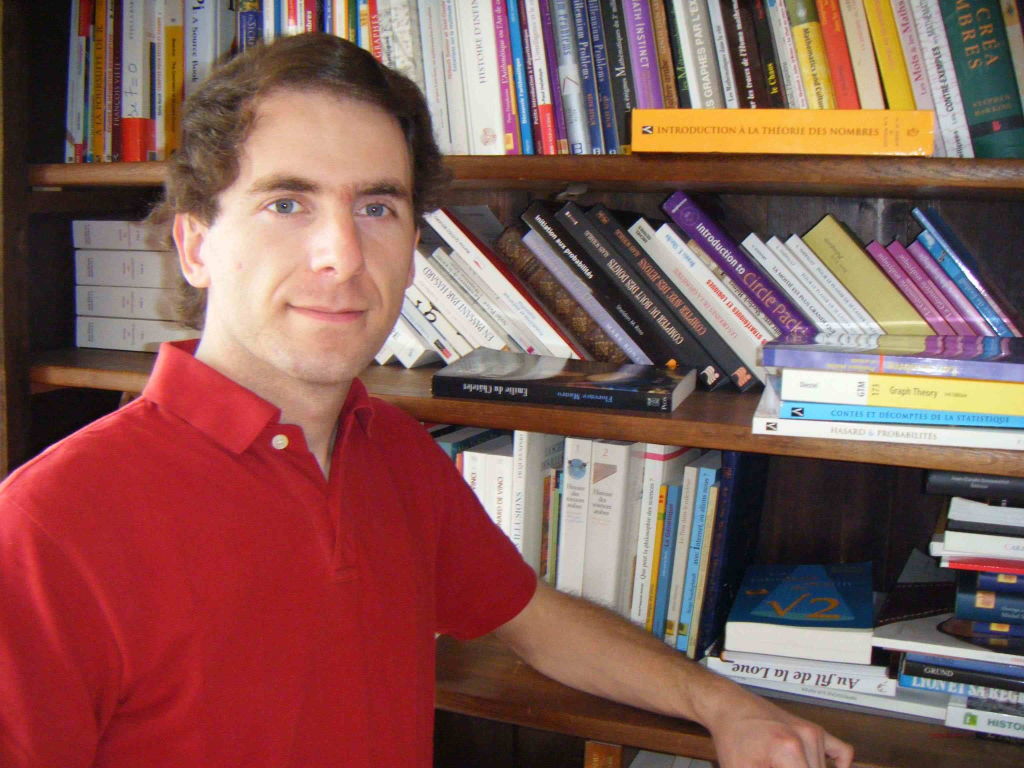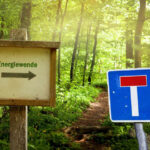
Het internationale klimaatsceptische debat wordt gedomineerd door de Angelsaksen. Op dit blog wordt veel aandacht geschonken aan hun opvattingen. De Duitsers zijn echter ook al vele jaren actief. Belangrijke Duitse websites zijn die van EIKE (‘Europäisches Institut für Klima und Energie’) en ‘Die Kalte Sonne’. Daarnaast blogt Pierre Gosselin vanuit Duitsland, maar zijn website is Engelstalig. Daarmee vervult hij een belangrijke brugfunctie, in die zin dat Engelstaligen op de hoogte kunnen blijven van de ontwikkeling van het klimaatdebat in Duitsland.
Door de taalbarrière zijn we minder op de hoogte van de ontwikkelingen in Frankrijk. Maar mede door de oprichting van het ‘Collectif des climato-réalistes’ (zie hier en hier) lijkt daar toch ook geleidelijk verbetering in te komen. De wiskundige Benoît Rittaud is voorzitter van deze vereniging.
Onder de titel, ‘They Thought They Were Saving the World: Book Review’, schreef Geoff Chambers een Engelstalige recensie van het recent verschenen franstalige boek van Benoît Rittaud: ‘Ils s’imaginaient sauver le monde: Chroniques Sceptiques de la COP21.’ (‘Zij verbeeldden zich de wereld te redden. Sceptische kronieken van COP21.’). Zie hier. Voor de francofonen onder de lezers: de Franse samenvatting is hier te lezen.
Ik pik een aantal krenten uit de Engelstalige recensie.
Our colleague Benoît Rittaud, president of the Association des Climato-réalistes and senior lecturer in mathematics at the University of Paris 13, has a book out: “Ils s’imaginaient sauver le monde: Chroniques Sceptiques de la COP21.” (Books Editions 2016). I recommend it strongly to anyone who reads French, not just for the clarity of its exposition of the sceptical viewpoint and its ironic comments on the imbecilities of the COP21 conference, but for its frequent illuminating asides, the originality of which stems perhaps from the fact that Benoît is thinking outside the Anglo-Saxon box, drawing on a quite different cultural tradition. I intend to translate a chapter or two, but in the meantime I’ll try and give you an idea of what I mean.
Benoît starts with a reflection on the natural reaction of the normal scientist, (citing Kuhn) which is to trust experts in fields outside his own, and on his first response to his own doubts. He says:
From the point of view of the normal scientist, it’s easy to understand that when you see the epistemological warning light flashing, indicating a problem within institutional science, this is going to provoke a certain mental disturbance. The two main blogs confronting each other at the moment of my conversion were RealClimate, manned by a team of climate scientists, representing the voice of official science as it were, and Climate Audit, run on a shoestring by the Canadian Steve McIntyre, who had no particular scientific status. And yet his site was far more precise, detailed, and factual. Climate Audit displayed scientific rigour; RealClimate offered personal attacks. In this case, it was the amateur who was following the path of true science.
He gives a long account of his inner conflict which would be most unusual in an English-speaking author, I think, but which harks back to Socrates’ dictum “know thyself”, and to Descartes’ use of introspection to free philosophy from its scholastic bounds.
The main bulk of the book consists of a beginner’s guide to scepticism, with references to Steve McIntyre and Anthony Watts (and Josh!), as well as to two distinguished French scientists who have dared to express their scepticism – Vincent Courtillot and Claude Allègre – interspersed with a caustic day-by-day running commentary on the unfolding COP21 circus. There are quotes which English-speaking readers won’t be aware of, like President Hollande in Manila attributing earthquakes to global warming, or ex-Minister of the Environment Corinne Lepage calling for a register of climate sceptics to be made for some later unspecified use.
He has an interesting theory about the 1.5°C/2°C “controversy” (if that’s the right word for a discussion which had all the intellectual interest of a discussion of the relative merits of “hocus pocus” and “abracadabra”). …
Everywhere there are parallels with the British, American, Canadian or Australian experience, and interesting details which can only help to complete the picture. There’s an account of the sacking of the TV weatherman Philippe Verdier which we covered here, and of the “Wanted” posters placed outside the hotels of sceptical scientists attending an alternative event by the rent-a-mob activist group AVAAZ.
The extracts from the COP21 agreement with their multiple square brackets are treated with suitable derision, and the ecstatic acclaim with which the final document was greeted is comapared to the Tex Avery cartoon character running over a cliff and continuing to advance, unaware that he’s walking on thin air.
But it’s not all science. There’s a chapter on Pope Francis’s encyclical ‘Laudato Si’. The Pope cites his sources, as any scientist would, and Benoît checks them, just as you or I would when reading an article in Nature or at the Conversation. ….
Benoît frequently steps back from the essentially farcical tale he’s telling and tries to make sense of it all from a long-term socio-historical or political point of view, much as we try to do here. Some of his ideas are interesting variations on what we read and write on English-speaking blogs; the suggestion that climate catastrophism might be a kind of psychological aftershock of the fear of nuclear holocaust which was largely dissipated (quite unjustifiably, in my opinion) by the fall of the Soviet Union; or the religious analogy, harking back, not to a vengeful Judeo-Christian god, but to Zeus and his thunderbolt. …
Aldus Geoff Chambers.
Lees verder hier.
Voor mijn eerdere bijdragen over klimaat en aanverwante zaken zie hier, hier, hier, hier en hier.





Psychologische aftershock, nuclear holocaust fear or imbicilities. Ik twijfel. De vonk was de ineenstorting en failissement van de wereldsovjet-vrede-ideologie (MIR), die werd overgenomen door hierdoor wereldwijd gefrustreerde “internationalen” als oprichters van de alarmistische groenrood gepolitiseerde Club van Rome, de Bilderberg conferenties, gevolgd door de oprichting van het VN-IPCC (met primaire opdracht tot het CO2 schuldigverklaren) en hun huidige GroenLinkse “klimaatvredesapostelen” . (En alle financieel gesteund door de donaties/afpersingen van de oliebranche!).
Wat betreft president Hollande met zijn uitspraak dat klimaatverandering aardbevingen veroorzaken zijn er twee mogelijkheden.
1. Hij gelooft het en zegt het.
2. Hij gelooft het niet, maar zegt het toch.
Beiden vind ik griezelig.
Het leidt af van de werkelijke problemen.
In Frankrijk zijn alleen ambtenaren gelijk, vrijheid geldt voor politici en broederschap is voor vakbondsleden.
Mwah.. In de verste verte kun je natuurlijk beargumenteren dat als de poolkappen smelten en door gewichtsverlies ter plaatse tectonische veranderingen gaan plaatsvinden die misschien wel over de hele wereld merkbaar zijn. :-)
@Soepie 4.34 pm.
De poolgebieden hebben na de laatste ijstijd erg veel ijs verloren, 120 meter zeespiegel stijging. Het ijsverlies nu, 2 mm stijging van de zeespiegel per jaar is slechts kinderspel.
Circulation noordelijke verantwoordelijk van de huidige koeling in Europa.
https://earth.nullschool.net/#current/wind/isobaric/500hPa/overlay=temp/orthographic=-333.41,88.48,396
https://earth.nullschool.net/#current/wind/isobaric/70hPa/orthographic=-333.41,88.48,396
Kantel ook maar eens naar de Zuidpool ;-)
Klik op Earth.
https://earth.nullschool.net/#current/wind/isobaric/70hPa/orthographic=-314.62,-86.82,345
Antarctica : Stientje van Veldhoven D66 kamerlid was er geweest. De gletsjer was weg, waar ze was, zei ze op “De slimste mens”. Slim? https://iceagenow.info/record-cold-antarctica/
De verdeling van ozon in de lagere stratosfeer.
http://www.cpc.ncep.noaa.gov/products/stratosphere/strat_a_f/gif_files/gfs_t100_nh_f00.png
Ijsdikte in het Arctische.
http://ocean.dmi.dk/anim/plots/ice.arc.1.png
http://ocean.dmi.dk/anim/plots/eta.natl.1.png
http://ocean.dmi.dk/anim/index.uk.php
Kwakzalvers verkopen schijnzekerheden, een gouden handel. Maar wie had gedacht dat de hele westerse wereld aan bedrog ten prooi zou kunnen vallen. De vraag werpt zich op hoe lang het gaat duren om van deze dwaling af te komen. En zal het klimaat alarmisme zich bij naderende ontmaskering aanpassen?
Vergelijk het met de evolutie: amoreel, succesvol is wat werkt. De natuur zit barstensvol parasieten. Wij leven dankzij ons immuunsysteem. Maar de samenleving heeft geen afweer tegen het alarmistische virus, dat zich als wetenschap heeft vermomd. Misschien was het geloof in een almachtige God zo gek nog niet. Vooruitgang is het verbeteren van het heden, de toekomst hoort in Zijn hand, inclusief het klimaat zolang wij daar weinig van begrijpen.
Wel apart dat alleen die paar CG reaguurders zien dat de hele Westerse wereld aan bedrog ten prooi vallen….
Of toch weer een geval van oogkleppen, complot denken…
Géén complot: Slechtst een GroenRode machtstreven/ideologie/utopie/beweging geheel losgezongen van de kritische wetenschap.
Klinkt slim en logisch turris. Alleen CG snapt het. Alle overige mensen, wetenschappers, politici enz zijn links en groen…
En zie daar. Daar komen ook de oogkleppen van Arjen tevoorschijn. Geloof jij lekker dat alleen CG er zo over denkt..
Arjen,
Wel eens gehoord van het global warming petition project?
‘31,487 American scientists have signed this petition,
including 9,029 with PhDs’
Hallo Erik,
Daar had ik nog nooit van gehoord. Wikipedia geeft aan dat petitie niet onomstreden is. Belangrijkste punt van kritiek is dat een overgrote meerderheid van de ondertekenaars niet deskundig is op het vlak van klimatologie.
Verder vermeld je er ook niet bij dat de petitie van 1997 is. Er is ondertussen veel veranderd.
Erik,
die petitie is onzin. Inderdaad kon iedereen die tekenen
Arjen
Over klimaatonderwerpen is wikipedia een verdachte bron. Dus beter kijken op de bron van het project:
http://www.petitionproject.org/review_article.php
Bij de totstandkoming vh project hebben tegenstanders getracht zand in de wielen te strooien, door zich onder allerlei pseudoniemen aan te melden. Zie de faq’s.
Er is overigens in de broeikas gas hypothese weinig veranderd sinds 1997. Wel is er sindsdien een reusachtige homogenisatie van (surface)meetdata opgetreden, waardoor deze beter aansloten bij de berekende data vd modellen. Alleen de satellietdata zijn daar gelukkig van gevrijwaard, tot op heden tenminste.
Arjen, je hoeft geen klimaatdeskundige te zijn om grafieken te lezen en te zien dat er niets klopt van de voorspellende gaven van de computermodellen.
David,
het kenmerk van religies is dat ze soms erg lang stand houden. Buitenstaanders verbazen zich over het domme geloof in iets wat ze niet zien of merken. Maar toch blijft het vaak bestaan.
Ik ben bang dat de klimaathysterie ook zeer taai zal zijn en niet gauw zal verdwijnen. Wat moeten de angst profeten dan weer gaan verzinnen?
Geloof (religie) heeft vele dimensies. Oa firewall tegen angst. Ook sociale cohesie. Zingeving. Als iemand 3x “waarom” vraagt dan weet geen prof. het antwoord meer. Geloof geeft antwoorden en verklaringen die de wetenschap niet kan leveren. Kapelletjes neerzetten voor Gods zegen is van dezelfde orde als windmolens plaatsen.
@david ,
je samenvattingen worden steeds beter.